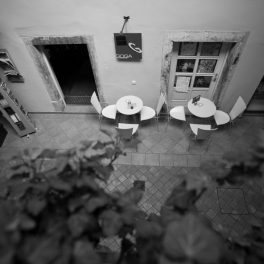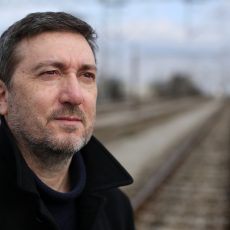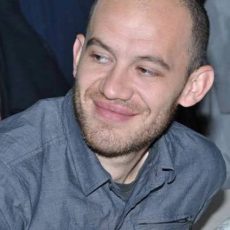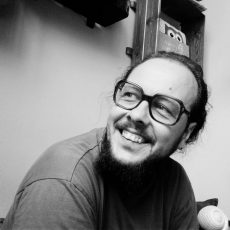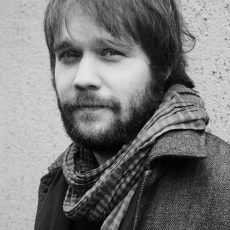COLLISION
That evening was as promising as any, a rainbow sluiced down the streets, a reason was found, as if the apartment were overheated, we were sweating. You landed some coke and were pleased. You drew two lines and handed me the sliced-off section of a straw. Bitter and seductive. You lit a cigarette, took a sip of rakija, settled into the armchair. Relaxation and contraction of muscles, backs straightening up. Soon you were chatty, words like grasshoppers came bubbling from your mouth. You retold events, circumstances: aboard a night train on the way to the seacoast. With Mama and Papa. You were still a boy. A rickety couchette, an endless ride. In the bunk across, a girl you didn’t know was sleeping. Older, maybe twenty. Her knees were shapely and provocative, they poked out from under the bedding, she breathed deeply, with excitement, dreaming about something. Her lips were slightly parted. All night your erection didn’t let you fall asleep. Then there was something in Barcelona (or was it Madrid), you were supposed to catch a morning flight to Belgrade. You got up on time. You were ready. You sat down briefly, fifteen minutes or so, just waiting for the right time to head for the bus stop. You fell asleep at the table propped on your hands. The previous night had been wild and draining, you’d hardly slept. You woke with a shock, sprinted to catch the bus, nearly missed it. At the last stop it became obvious you weren’t at the airport, you’d gone in the wrong direction. Once you realized this it was already too late to go back. The plane was taking off any minute. You got drunk and had the time of your life. Photoshopped memories. There were more:, something about waking up in a strange hotel room, in an Arab country (Kuwait? the Emirates?). Alone. With no recollection. How did you get there? So exciting. You were quick-witted and charming. I laughed. Then how you stole some ice cream in the third grade and were later caught. Afterwards what a mess…
What you give to me, you’ve given to everyone else.
The right side of my jaw had grown agreeably numb. I was alert and present. I listened to you carefully, with focus. You were in control, the master of the situation, you spread yourself around the room like some sort of lush carpet. You were proud, completely drawn into the story, the memories. Your life, such a special life. All the events, actions and people. You digressed. There were so many engaging experiences, one after the other, big ones and little ones, some of them sensational. You flickered on and off like a firefly. These stories were all you had. They were your skin, they interlaced your organs, multiplied by mitosis, flowed through your blood vessels. You must have told them so many times. You knew their trajectory by heart, every curve, every detour, the crowning moment, every pause, every place for a smile, every passing detail suddenly so interesting, in color. Trained, well-versed, up to speed. I found your performance appealing, I liked your stories and your practiced, self-confident moves. All those successful methods, for years tried and tested.
This was our third time together. Each time in your apartment. A familiar setting, familiar scenario, the only change being the light, and the props. We kept our distance, didn’t touch. You wanted to step out of yourself, to detach, you wanted to do something, undertake something, but you didn’t know what. You couldn’t figure out how, this was an unfamiliar story, in it there were no other people, there were no names to be named, no facts to be laid out. This story was not in the past, it depended only on you, it was terrifying, it was uncertain, it was unknown, it was unpleasant, it had no clear end. Then again, maybe not. It is more likely that you were merely bored. You needed company, something to distract you, light entertainment.
At moments the silence was as loud as a thunderclap.
Nervously we clenched our teeth, drummed our fingers on the table. We wanted to sink into something soft and warm, a thick duvet, pillows. We wanted to stretch out, to grow curvy and moist, to blossom, but there was no place for that, no time. Only a twinge. Drifts of expectation, a gaze wandering, inflows of unpleasantness, mild boredom, a non-specific need for us to do something. To enunciate everything, eyes wide open. As if we’d set out to go somewhere, we’d headed in some direction. If something happens? But we couldn’t remember where. We marked time, we waited for somebody, we wished for a signpost, some guidance. You played your role, it had its own identity, experience. The path before us branched and sank. An idea about retreating, a scene set, cleansed of all the noise.
You drew two lines more and poured yourself another rakija. Your eyes glistened in the dark. You paced around the apartment, poured some water, and did something else. You were opening the refrigerator, drawers, looking for something, you fed the dog. You felt me watching you, you felt me hearing you perfectly. I was so pushy. That made you uncomfortable. You were smoking, cigarette after cigarette. Defended yourself. You wanted for the attention to flag, the unbearable immediacy. You wanted to vanish, to become one with the background. You wanted to exist in the eyes of others. You wanted to be outdoors, among people. You wanted dimmed lights and arms to hug you. You wanted easy company. You wanted it to be dark. You wanted there to be somebody else. Someone you could turn to. Someone who knows your story, who accepts it. You wanted to forget. You wanted to speed up sluggish time. You were anxious. Non-specifically. You texted someone, talked on the phone. Fidgeted. You suggested we go somewhere. I didn’t care. We smoked while we gathered our things, listed our options.
We went out, legs carrying us. And the cocaine. Late autumn, but very mild. We walked along side by side and watched the streets. We each had a beer. Full of ourselves, we chatted and swayed, cruised through the city, had another beer, took each a line. The evening was passing without excitement. Back in your comfort zone, among familiar people, you kept a safe distance. You stood in the dark, in corners. You drank moderately, you texted relentlessly, bought some people a couple of drinks. Same distance from everybody. Good-natured and cheerful. You are a man who is always close at hand. You’re a fine friend. You’re a person who says hi, who laughs. You’re charming, you’re seductive, you’re so dear. You’re dignified and serene, long time accustomed to not feeling anything overly strong. You are a person other people talk about. You are a person who talks about others. You are desirable company. A commonplace. You are like the English language. Small talk. Nearly kitsch. An empty story. Service information. Pop culture. On everybody’s lips. You’re a part of the world. You are not the other, you are someone else. You are a lifeless thing, a still life. You are like a model, a life-size sculpture. Reminiscent of a person.
We circled the club a while longer, slowly finishing our beer. It stopped being interesting. We drew closer. All out of boredom. We left.
We woke up without a word, each on our own side. Depleted and absent. We stared at the ceiling. We patted the dog. We breathed. I reached over with both hands. I wanted to touch you. Skin that is real, the only thing able to talk.
But you leave my hands there all alone. Superfluous and in vain. You don’t notice them.
I stretched out my hands, I wanted to touch you, to create you again, but you didn’t want to allow that.
You turn your back, you pull the duvet up over your shoulder, you shut your eyes.
I wanted to get closer, to press my body to your body. I wanted to wake you, to shake you, to bring you back. I wanted to wake up, to feel aroused, to remind myself, I wanted to imagine you, give birth to you again. I wanted to tell a lie. I wanted not to know. I wanted to be a weak body. I wanted to be a body that hopes, that gives of itself. I wanted to be arms that hug, breathing that quickens. I wanted to be lips that think that if they were to kiss tenderly enough, long enough, these kisses will somehow continue inside me. I wanted to defy certainty, to repel it, make the present last as long as possible, this unbearable deaf moment. You lay there calm, distant and still. I lay there calm, distant and still. Afterwards I got up to make coffee. Morning changed nothing, the day still hadn’t begun.
I am awake, nevertheless. The coffee tastes the same, and under the hot shower the body relaxes in spite of itself. I have obligations! I ride like a phantom across the concrete prairie. Around me, Belgrade breathes and multiplies at every step. It could be said: a big city. But where are all these people otherwise, where are all these dimensions, the hidden worlds eluding grasp?
World no. 1: At the bus stop. Not a lot of people out on the streets, mainly its buildings and the occasional structure: gas stations, cars and furniture showrooms, billboards, the omni-present containers with trash. Among them a car holds the place of honor, a prize for something or simple advertising, its making a show of itself on a pedestal, at the intersection of Omladinskih Brigada and Jurija Gagarina, red, a reminder instead of a monument, always well polished, it is a placeholder. But the Chinese are awake. Already busy and rushing, rolling by in their vans and swarming around the shopping center which comes alive and is almost about to stand up, slowly straightening up on its four stunted, scrawny legs, in its natural, modernist habitat, surrounded by massive swaths of concrete, frozen earth, muddy grass and broad paths intended for vehicular traffic of something much larger, this gigantic green-blue armored bug, which now stands entirely stable, like an intergalactic AT-AT, shakes off colored beads, plaid tote bags, while people step out of their freshly opened shops studding the façades of the building, joyously clapping their hands and waving gaily. The mobile shopping center, Kowloon, a walled city, tiptoes off, step by step, somewhere in the general direction of Bežanija. Right behind its back left leg, the articulated #95 bus, finally swings into view.
(Jurija Gagarina – Antifašističke borbe – Milutina Milankovića – Milentija Popovića – Mihajla Pupina)
World no. 2: Brankov Bridge. A back up on the bridges, the narrow bottlenecks of the city. We inch along, the view opens out before us, the vastness from all sides presses in on our yellow tin can even more harshly, more brutally, I breathe a little, modestly claustrophobic, a panic attack anticipated as I suck in what’s left of the air, and imagine its abundance… outside… with a view of Belgrade Waterfront, which intersects the horizon, sparkles for the poor, actually against them, each day all the higher, more grotesque, less needed. Time flows by in bits, or overflows, waves with a regular and irregular beat, three eight time or as needed, today, for tomorrow, one hundred fifty hours all at once, or fifteen per day, out of necessity, just once more, for those who are moving, who are fed by no one, for those who are late, those who collide, who thrust one another away or are thrust away, who faint or cling heroically to that speck of smelly oxygen, eagerly awaiting the next opening of the door, heads raised above the mob, noses stuck up not out of arrogance but out of need, on the bus, planted in the seats, the grabrail in hands, motionless, like gymnasts, acrobats, but with no skill to defy the pull of gravity, or, merely, to defy. Planted. Regularly. Like sardines. Among windows fogged by breathing, by all the sighs, not amorous. Feet welded to the wheels, they bounce as they meet the potholes, tram tracks, cracked and re-patched pavement, they jounce, glued, tied by drawstrings, affixed by skins and hairs and the occasional bobbypin that comes undone, umbrellas dripping onto boots already caked with slush. Heads drop into laps, then roll away.
World no. 3. Zeleni Venac. The pljeskavica burgers are on the grill, the smell of Macdonalds’ fries spreads, uphill, down stairs, a line for bread rolls, through an underground passageway where there are no beggars, nor cardboard stands vending socks, watches and belts this early in the day, then upstairs, the exchange office is (always) open, uphill, another bakery, a pastry shop, another exchange office, a shop, a crosswalk. Hotel Moscow, people trading album stickers, I run for the trolley. Everybody’s asleep, I’m dreaming.
World no. 4: A Postcard from the Future. The traffic jam in the city is not as bad so the trolley slides elegantly toward the Slavija roundabout, with the lavish musical fountain right at its center. While we circled (the obligatory three times around, as required by the new traffic law) the fountain changed hues from blue to red and sang brightly “Belgrade, Belgrade, we all adore your singing streets…” The trolley was beeping as were the other vehicles, while the people in them (including me) joined in to sing the song and swayed back and forth, beaming (this is also required) and so we inched along performatively around, around. On all sides of the roundabout people in clusters gawked at the fountain, enchanted, or—cell phones held high—filmed this spectacular attraction: harmony within and chaos all around it, the authentic Slavija experience. Others waited in line at the control panel that manages and guides the fountain’s water jets, impatient to become, themselves, its more or less talented conductors.
Similar installations now grace the city at the Bogoslovija roundabout and in Karaburma. The Slavija fountain remains, however, the most grandiose, by far, with its 800 square meters of water surface, 300 reflectors, 350 water jets, and the crossbar a full 32 meters long. Heaters keep this lithe water ballerina toasty all winter long, so it can perform uninterrupted, even when the temperatures drop to -20 C°. “Every city aspiring to make its living from tourism must have at least one such structure; this is what sets the great cities apart from the small ones,” said the city manager when it opened in 2017. No argument here. The fountain certainly proved to be a big hit for tourism. And not only the fountain. There are other features of note: the highest tower in the Balkans, the largest shopping center, the longest café garden (almost two kilometers in length, it runs down the Sava Quay on the Belgrade side of the river from the old railway bridge to the bridge at Ada). Other record-breaking accomplishments: the most billboards per square meter for instance, or holiday lights up all year long—snowflakes, sparklers and Christmas trees. Many other measures are equally notable. Factories and all other plants manufacturing anything in the city were privatized years ago, and later transformed into mixed-use commercial-residential properties. The explanation was simple: factories are ugly, and besides, why should we produce anything if we can simply import it, and at a lower cost? Public and communal services were modernized through private-public partnerships, after which they have ceased to be available in the unprofitable parts of the city. The population is largely employed in the service industry, meeting any and all touristic needs—restaurants, clubs and cafés, fast food and delivery, hotels and private accommodation, shops, tourist agencies, companies for cleaning and organizing, the taxi industry, call centers.
Contemporary Belgrade is postmodernism incarnate, perhaps even more convincingly than is the case with Skoplje. The Skoplje project signified something, even if what it signified was fake or fabricated, it did serve a symbolic function. The Belgrade project, by contrast, has remained true to the decision to symbolize nothing. Anything goes. It has nothing to say but: money. Ultimate de-territorialization. In that sense the newly built infrastructure in Belgrade was even more efficient in creating museum-like experiences and impressions, it was even more aggressive, even more vacuous, more lacking in ideas, especially ever since the urban development of the city has turned exclusively to the needs of tourists, foreign investors, and business owners. Belgrade became a top destination to visit when the Municipal Board for Branding came to understand that the city’s tourist potential and receptivity lay precisely in the senselessness on which its recent urban transformation was based. Not long thereafter, the brilliant ad slogan “Belgrade—Horrors of the Postmodern” saw the light of day, spreading out in an instant, like an Adriatic wildfire, among the hipsters of the world (of course the concept was stolen from an anonymous Facebook group). The slogan “Horrors of the Postmodern” literally ate Berlin’s “Poor but Sexy” for breakfast, and the city has since then been swamped with tourists. In no time there were almost no residential buildings left in the city center, except those used as apartments for tourists or ones belonging to the gated communities springing up all through the city after the famous “Belgrade Waterfront“ project came through. The area is mainly hotels, supermarkets, restaurants, parking lots, co-working and co-living spaces, start-up incubators, banks, commercial and shopping zones. The former Military Headquarters building has been transformed into the magnificent Splendid Hotel. The Museum of Contemporary Art is now the seat of the White Community company, that owns large portions of what used to be Vračar, Upper Dorćol, and Zemun. These are now White Community I, II and III. As of last year, White Community owns the entire area of the former Friendship Park where ground was recently broken for White Community IV, a new lavishly furnished residential-commercial property. All the property within the circle of #2 Tram line was successfully privatized some time ago, due to which the city center is now closed to visitors at night, from midnight to 6:30 a.m., except of course for those who are staying there, and over the weekend, when the sky above it, for security’s sake, is thick with drones, and the streets are bristling with the automatic weapons of private security companies.
When a jet of water shot sixteen meters skyward, dozens of overjoyed observers, tourists, and Belgraders took selfies next to this grandiose symbol of the city. Meanwhile I went on loudly singing “As if the time stands still for yooooou,” while traversing through the window of the trolley, where I’d been sitting, to a nearby tram that was running along in parallel, the way they do in action movies, but as if in slow motion. This performance, switching transportation midstride without waiting, was, of course, yet one more of the famous attractions of Slavija, which I finally lost the sight of once the tram I transferred to, began moving up Beogradska street.
World no. 5: Along the Boulevard toward Vuk and farther along to Đeram and Lion. Nameless trees along the city’s avenue slice into the sky. Preventively castrated decorative plantings, reduced to their desirable size—height and width and depth, and all other dimensions, such as—time, which stands motionless, tamed, for the trees which will never reach their full height. For tree rings are not years, no sirree, what do you mean dendrochronology, forest anthropology, stop. Ready set go, for those who are not there yet, for those hurrying into yet another pledged day, from the morning on, in a fog, the pace drops off with the increase in concentration of those who are pacing, the number of thoughts per square meter, the number of screws, the density thick like fresh-cooked rubber, silence tiptoes out stealthily, the breaking of the sound barrier or mere noise, rush hour will start soon. The scattered light of the sky has squeezed itself into the bags under the eyes of the man behind the wheel. Crimson-purple. A strip in the windows, red like the map of capillaries on his nose and cheeks, traces of unslept nights: a surfeit of alcohol, sugar and caffeine, some say, simply, a rotten gene. The rhythm commanded by the miniature gearshift of the gigantic city monster—the red snake. The hour ticks by, the light is now translucent, the day dawns, it hesitates but yet it comes, always evenly, always untimely, the streets fill with hands and feet and mouths, propulsion on all fours, internal combustion of stomachs and motors, a row of muscles and a row of chassis.
. . .
I am the first to arrive at work, I smoke in the kitchen while drinking coffee. Then others arrive. Time passes slowly, though I’m constantly rushing. I copy and print, pack. I calculate—I tally chairs, signatures, public events, I count female participants, subtract nights spent, flights, meals, express everything in terms of quantity. Then I multiply that by type of expense and list it in four different currencies, calculating in exchange rate oscillations and rate of inflation for the last nine months. I operate on operating systems. I sign on extras, take bids (three bids for each expense running over €400), I schedule meetings, set up catering and sound. I organize panels, conferences, rallies, cocktails, and donor events. I write promotional materials. I plan activities and their optimal budgets, I justify their purpose, general and particular goals, the desired and anticipated outcome. I list indicators, describe everything in detail, taxatively enumerate the sources of information for their timely confirmation. I formulate strategies, inform policies, finalize the minutes. I respond to emails, produce statements, translate into English and French. I write reports, requests, and applications. Appeals. I sign. Stamp. Scan. Skype. I answer the phone and open the door. I write and register contracts, issue invoices. When nobody is watching I steal office supplies, teas and juices, household cleansers and toilet paper.
The loot for the day: gifts for Mom: a 16GB USB memory stick, three rolls of toilet paper and lavender-scented air freshener. Well armed. Prepared for a family dinner, a dinner for which the fact that it is happening within the family circle can only mean irritation and unpleasantness.
The familiar aroma of a gravy roux envelops me at the door. Father is watching television, a program about politics, while Mom is adding the finishing touches to a bean dish she pre-cooked last night. She is not particularly enthused about the gifts, or perhaps there is something else going on here: it looks as if, again, they aren’t speaking. Mother is disgruntled, and Father is disinterested and would be happiest if everyone would just leave him alone. We eat in silence, with the ever-present voice of the television announcer—the news. After dinner, Father disappears into newspapers, books, reports from the front, party debates, arguments, the opinions of political gurus, experts and independent observers. Or he naps, maybe he went out? As soon as he vanished from my field of vision I stopped paying attention to him, when the door closed behind him both Mom and I breathed a sigh of relief.
The two of us, like conspirators, but with no particular conspiracy, no mission, cloister ourselves in the kitchen, barricaded, we drink wine and smoke. Mom reports: a detailed description of her fight with Dad (all four phases which I’d missed since we last saw each other), a brief interlude about how she misses her job (she was only happy when she was at work and now that she’s retired there is almost no joy left in her life), service information about members of the close family (brother, uncle, grandmother), and then again about how she can no longer bear the life with Father, this apartment is like a jail, here she feels uncomfortable, and more still, all the things that she does, which he never even notices… nor does anybody else for that matter (brother, uncle, grandmother), all this is expected of her, taken for granted…
At least some acknowledgment, at least a little gratitude, that’s all she needed, but to ask for it she never dared, or was able to. As usual I was full of compassion for her and disapproval for those others, those who hadn’t put her in that position, but who nevertheless kept her there, by the skin of their teeth, implicitly, through the rules they’ve imposed on her. She wasn’t able to stand up to this. Things happened, one after another, life the way it was supposed to be, it now seemed imposible to grapple with it, she felt she’s been locked in, and this position seeemed, in an obscure sort of way, to agree with her, it had left her generous space for complaint: everything was bigger than her, mastering this mountain was unimaginable. That which was giving her a sort of peace of mind was her deliberate embrace of this destiny, as she understood it, which allowed her to always already be half a victim, and half in control, convinced that nothing is up to her. Also, she believed that what goes around comes around, both the good and the bad. She wasn’t particularly religious, but she believed in justice, “someone up there sees it all”, and that somebody, of course not she herself, will sooner or later free her (probably in the form of death). Also, somewhere in her deepest depths, she thought that she probably doesn’t deserve better, or rather that people as such don’t deserve better, she understood life as an ever-present dull ache and worry, an eternal field of everyday routine and defeat, quiet sorrow and creeping calamity, with the occasional, rare but precious, random joyous moment (mainly connected to her children).
After we’d spent the usual hour or so on her self-pity—all her choices bad choices (except for having children), irreversible decisions, fate sealed, already played out, her life as déjà vu, been there done that, experienced, permanently beyond her reach—Mom changed the subject.
“My doctor says I had a little stroke,” she told me as an aside, while lighting her tenth cigarette, finally sitting down again after having put all the food into smaller containers, hermetically sealed them and stowed them in the fridge.
I stared at her, astonished, in a state of mild shock, and couldn’t think of anything appropriate to say (except some confused half-questions—excuse me, how, when) before she, after holding back a moment, launched into her explanation:
“That thing a few weeks ago, you know, I told you, when my vision suddenly blurred … Well, remember, that’s what it was, apparently, after the tests. It’s not so bad,” she added quickly, “it was just a brief interruption in blood flow to the brain, blockage of blood vessels… Don’t you worry a thing… it’s just a little stroke (stroke, this echoed), no permanent damage, in any case nothing chronic… I’ll do fine… I’d do fine, but he, I’d do fine, this is all happening to me because of him, I can’t bear it anymore, and can you imagine what he says, he says I’m exaggerating, I’m a drama queen, I’m making this all up or I brought it on myself, he says, imagine that…”
I was no longer listening to her with full attention because I was already deep into studying search results to the query “causes and prevention of strokes”, which I undertook with lightning speed, on my phone, and besides, there was no other useful information to be extracted from her anyway. “Here, it says here… Ah ha…” I read out loud, interrupting her new monologue about Father and all the other indignities visited upon her which were responsible for her physical and mental state: “a ‘transient ischemic attack’ (TIA) is a brief episode of neurological dysfunction lasting no more than sixty minutes which does not result in permanent brain damage… It may manifest as a brief disruption of brain functions or the retina.”
Mom had meanwhile stopped talking, she’d withdrawn and seemed sheepish, like a child who knows it has done something it shouldn’t have, completely helpless, she stared at the floor, wanted me to feel sorry for her.
Because of this behavior of hers I suddenly lost my usual cool and compassion, her sickliness endlessly infuriated me, and I was irritated and edgy anyway. I set upon her like a downpour, as if that would accomplish anything.
“How about smoking less, Mom,” I continued, giving her a judgmental glare and was already yelling, “or why not, just quit? A proper diet…,” I consulted my phone, reading, “A proper diet after a stroke, here, it says everything here, Mom, I’m always telling you, less meat Mom, less salt Mom, be sure to avoid all processed meats Mom, fatty cheeses, milk and butter, pork lard Mom, also you need to be exercising Mom, and stop being so nervy, that makes no sense at all… how old are you, anyway, make your peace with your situation or change it, enough with all the complaining, Mom…” I was starting to snap and was really losing it. “I’m serious, cut out the suffering thing already, your endless fatigue and helplessness, always the victim, it’s like you want to be oppressed, the more you suffer the more radiantly you shine, the more you agonize, the prize you imagine grows ever more magnificent, seriously, it’s as if you’d love to die, maybe you’re even hoping to, no, you’re actually wishing for someone to kill you, this is how you think you’ll become a proper martyr, a canonized saint, lavished with the praise you deserve for all your pains, awarded with a certificate: the words she sacrificed herself selflessly for others inscribed on your death notice, but that’s pointless, Mom, I’ve told you a hundred times, the prize you’re holding your breath for isn’t there, nobody will notice your sacrifice, not here or anywhere, understand this for once, nobody cares, at least not that much, and even if you were to get your prize, you’d be dead, it just won’t matter.” Then I stopped abruptly, regretting that yet again I hadn’t been able to bite my tongue.
“Yes, yes, you’re right, I know you are,” mumbled Mom in a conciliatory tone while getting up to find her savior, Bromazepam, or the equally efficient Xanax, the heroes of oblivion, “I didn’t mean to upset you.”
“You didn’t upset me, Mom, I’m not upset,” I said, now calmly and reasonably, “you’re upset, you’re always upset.”
“Yes, yes, I am…” she repeated, “This is all my fault…”
“Come on, nothing is your fault, woman!”
“Don’t you worry about a thing, dear,” she smiled, “everything’s over now.”
“Over? Nothing is over,” I began to fume again, “nothing is ever over.”
“Don’t get all worked up,” she said after she’d taken the pill, “Mama’s little darling. Everything will be just fine.” And right after that, as if the tablet had an instant effect, the shine left her eyes and her body went a little limp. She was no longer there, she was shrinking in the chair, hissing like a deflating balloon, her cheeks sagged, and her hands hung by her sides as if they didn’t belong to her.
“It will be, Mom,” I said, “I keep telling you, think a little more about yourself.”
“Yes, yes, you’re right…: she was already sinking into numbness. “Mom’s going to lie down now.”
“OK, Mom, I’ll be off then.”
“Good, good, Mama’s darling.”
. . .
A little later that day (night was already well along), out for a drink with Mini (who quickly switched to rakija) all the talk was about survival strategies (this has long been the only subject of discussion). As if wrapping up the conversation, Mini sang:
our hearts are empty
the smoke is heady
we didn’t see the day
Then she changed her tune, because she suddenly turned seductive, becoming in a flash a true Eurydice, sensitive and tender, ready to be saved or ruined, fully obedient and meek, her voice soft and velvety, and her hips curvy, breasts round.
wounded and so alone
wounded right in the heart
she hums as she sidles over to the bar, she’s been actively flirting with this waiter for some time now. He is nice-looking enough, but does that even matter. He could have been a zombie, no difference in the end. Mini twitters with laughter at his every word and swings her hair. She purses her lips meanwhile, but mostly she talks loudly and brashly twirls her glass.
The rest of the bar as expected. Mutual assessments and observations. Secret signals. After all, the soul police is everywhere, moralists of all stripes, the guardians of bourgeois ethics, they lurk from dark corners, poping up at every turn, poised to advise, to share their experience, their valued opinion, as if somebody has asked for it. In all the eyes, hunger; had there existed some sort of omniscient reader of human thoughts, I’m sure it would be constantly shrieking—let something happen, LET SOMETHING HAPPEN. But nothing happens.
Except, is that my phone ringing? I finish my drink, kiss Mini, I’m off to Vinsent’s.


